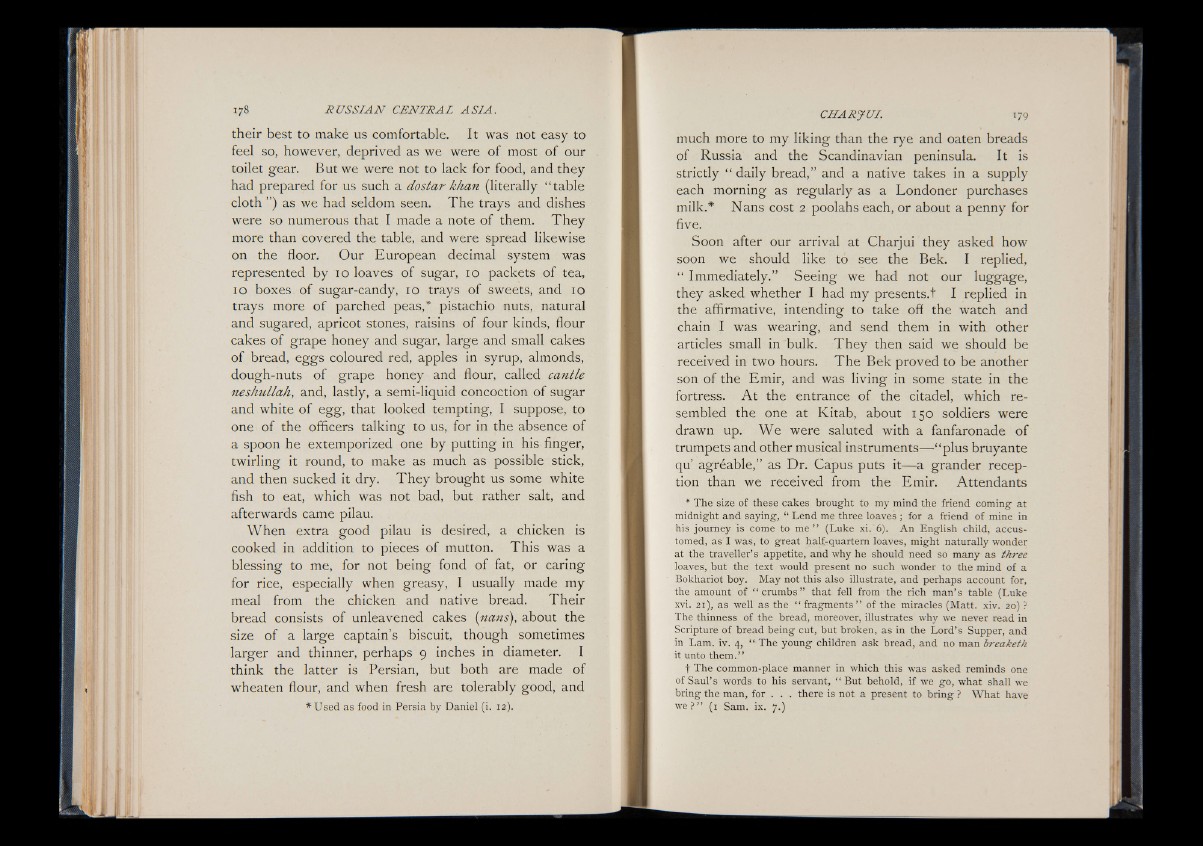
their best to make us comfortable. It was not easy to
feel so, however, deprived as we were of most of our
toilet gear. But we were not to lack for food, and they
had prepared for us such a dostar khan (literally “ table
cloth ”) as we had seldom seen. The trays and dishes
were so numerous that I made a note of them. They
more than covered the table, and were spread likewise
on the floor. Our European decimal system was
represented by 10 loaves o f sugar, 10 packets of tea,
10 boxes of sugar-candy, xo trays of sweets, and 10
trays more of parched peas,* pistachio nuts, natural
and sugared, apricot stones, raisins of four kinds, flour
cakes of grape honey and sugar, large and small cakes
of bread, eggs coloured red, apples in syrup, almonds,
dough-nuts of grape honey and flour, called cantle
neshullah, and, lastly, a semi-liquid concoction of sugar
and white o f egg, that looked tempting, I suppose, to
one of the officers talking to us, for in the absence of
a spoon he extemporized one by putting in his finger,
twirling it round, to make as much as possible stick,
and then sucked it dry. T hey brought us some white
fish to eat, which was not bad, but rather salt, and
afterwards came pilau.
When extra good pilau is desired, a chicken is
cooked in addition to pieces of mutton. This was a
blessing to me, for not being fond of fat, or caring
for rice, especially when greasy, I usually made my
meal from the chicken and native bread. Their
bread consists of unleavened cakes (nans), about the
size of a large captain’s biscuit, though sometimes
larger and thinner, perhaps 9 inches in diameter. I
think the latter is Persian, but both are made of
wheaten flour, and when fresh are tolerably good, and
*Used as food in Persia by Daniel (i. 12).
much more to my liking than the rye and oaten breads
of Russia and the Scandinavian peninsula. It is
strictly “ daily bread,” and a native takes in a supply
each morning as regularly as a Londoner purchases
milk.* Nans cost 2 poolahs each, or about a penny for
five.
Soon after our arrival at Charjui they asked how
soon we should like to see the Bek. I replied,
“ Immediately.” Seeing we had not our luggage,
they asked whether I had my presents.t I replied in
the affirmative, intending to take off the watch and
chain I was wearing, and send them in with other
articles small in bulk. T hey then said we should be
received in two hours. The Bek proved to be another
son o f the Emir, and was living in some state in the
fortress. A t the entrance of the citadel, which resembled
the one at Kitab, about 150 soldiers were
drawn up. We were saluted with a fanfaronade of
trumpets and other musical instruments— “ plus bruyante
qu’ agréable,” as Dr. Capus puts it— a grander reception
than we received from the Emir. Attendants
* The size of these cakes brought to my mind the friend coming at
midnight and saying, “ Lend me three loaves ; for a friend of mine in
his journey is come to me” (Luke xi. 6). An English child, accustomed,
as I was, to great half-quartem loaves, might naturally wonder
at the traveller’s appetite, and why he should need so many as three
loaves, but the text would present no such wonder to the mind of a
Bokhariot boy. May not this also illustrate, and perhaps account for,
the amount of “ crumbs” that fell from the rich man’s table (Luke
xvi. 21), as well as the “ fragments” of the miracles (Matt. xiv. 20) ?
The thinness of the bread, moreover, illustrates why we never read in
Scripture of bread being cut, but broken, as in the Lord’ s Supper, and
in Lam. iv. 4, “ The young children ask bread, and no man breaketh
it unto them.”
f The common-place manner in which this was asked reminds one
of Saul’ s words to his servant, “ But behold, if we go, what shall we
bring the man, for . . . there is not a present to bring ? What have
we?” (1 Sam. ix. 7.)